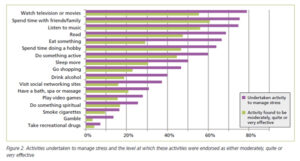
This is Part 2 of a two-part series on STRESS and how it impacts your health, body, AND your mind…
Being chronically stressed (as in being in a state of nonstop, unrelenting stress!), as so many of us are these days – you might think that it only affects your nervous system.
After all, that’s where you perceive it to be in abundance – because it’s quite literally is unnerving!
But, the truth of the matter is that stress can also compromise most of your major body systems, including:
- the digestive system
- the immune system
- the reproductive system
- other major organs
- even your posture and alignment
How stress wreaks havoc on your health – and how to curb the destruction!
As we talked about in PART 1 — chronic stress (or experiencing stressors over a prolonged period of time) can result in a long-term, and sometimes devastating drain on the entire body. Head to toe, tip to tail.
We already covered how it can negatively affect the brain and nervous system, the heart and circulatory system, the esophagus, stomach and digestive system, the pancreas (and blood sugar levels), as well as our reproductive systems and hormonal balance.
So, just when you thought that STRESS couldn’t possibly reach any further than that, here are 4 MORE AREAS OF HEALTH that get hit like a tornado when chronic stress is at play.
The Stress Response: IMMUNE SYSTEM
Let’s look at the physiology of this complex body system first…

The immune system is a collection of billions of cells that travel through the bloodstream. These cells move in and out of tissues and organs, defending the body against foreign invaders (antigens) – such as bacteria, viruses, as well as cancerous cells.
Keeping this in mind, stress can affect the immune system in 2 different ways:
- By creating chronic inflammation that harms the tissues and organs.
- By suppressing the immune cells (e.g. white blood cells or lymphocytes) that are needed to fight off infection.
We learned from Part 1 of this series that the stress hormone Cortisol naturally suppresses the immune system as a protective mechanism.
While this is actually a good thing in the short term, being under continuous, unrelenting stress may predispose you to infection and make you more susceptible to developing diseases.
In fact, studies show that the recovery time from illness also becomes longer if stress is present. This is because low-grade inflammation starts to perpetuate in the body, again, leading to many health problems.
Did you know that emotional stress is a major contributing factor in the six leading causes of death including coronary heart disease and cancer?!
It is also implicated in common health conditions such as the common cold, stomach ulcers, back, neck & shoulder pain, depression, and other mental health issues, sleep dysfunction, and even weight gain – see more about these last three below.
The indirect effects on the immune system are due to the less-than-healthy behavioral coping mechanisms a person may use to reduce their stress, such as drinking alcohol, smoking or binge eating — all known to impact the complex, interconnected immune system.
SLEEP & The Stress Response

Here are a number of ways that stress deconstructs your sleep:
{Adapted from The Huffington Post}
- It prevents you from getting enough (hours) of deep, restful sleep. Experts recommend 7-9 hours of quality sleep.
- It prevents you from falling asleep in the first place due to racing thoughts and a restless body – this is having a sympathetic nervous system that won’t shift over to the calming parasympathetic.
According to the Stress in America survey (done by the American Psychological Association), 43 percent of adults say that stress causes them to lie awake at night – that’s nearly half! - It impairs the quality of your sleep when you finally DO fall asleep.
- It can set you up for longer-term insomnia and a vicious cycle – that we’ve all experienced at one time or another: you’re stressed so you can’t sleep (or stay asleep) and you haven’t slept for days, so you become more stressed!
Point taken – get your ZZZ’s my friends!!
The Stress Response: MENTAL & EMOTIONAL HEALTH
As we’ve already talked about, over time, continued strain on your body and mind from day-to-day stress may contribute to serious health problems, of which mental disorders like depression or anxiety are just as common as any that affect the physical body.
The Australian Psychology Society (APS) reported from a 2011 study that “almost one in three Australians (32%) reported experiencing depressive symptoms, with 10% of these indicating symptoms in the severe or extremely severe range. Similarly, one in four of the population reported experiencing anxiety (26%).”
STRESS & YOUR WEIGHT
There are many chronic stressors to consider when it comes to how it may impact our *ahem* bottom lines!
This includes mental and emotional stress, food sensitivities (those specific foods that don’t play nice for you), blood sugar imbalances, hidden chronic infections (i.e. viral, parasitic, bacterial), and even excessive exercise.
Basically, anything that is perceived as stress – or stressful on the body.
Chronic stress leads to high Cortisol, and we eventually become completely resistant to it. This leads to a domino effect where the function of your other key hormones becomes blocked or stagnant, leaving you feeling tired, burnt out AND weightloss-resistant.
Put simply, you get stuck in a destructive stress cycle!
Here are some specific ways that stress can affect your ability to be able to maintain an optimal, healthy weight:
- The constant rush of stress hormones upsets your gut and makes it less efficient at absorbing foods, leading to weight gain.
- Lack of sleep (often due to stress!) impairs weight loss by increasing hormones that signal hunger, leading to overeating and cravings for starchy, sugary foods. Getting less than 8 hours of sleep a night or interrupted sleep has been shown to lead to creeping weight gain and an inability to shed the pounds if you’re on a weight loss regime.
- It has been reported that 87% of Australians prefer to watch TV as a means of relaxation. You can draw your own obvious conclusion there!
- When we’re chronically stressed, we certainly don’t grab the nearest bunch of broccoli! We grab a tub of ice cream because we’re endorphin-seeking and need a pick-me-up.
Oddly enough, broccoli would help us to achieve that in the longer run, but our brain seeks out instant gratification. So, ice cream is probably going to win out in the short term – but your growing bottom line shows the consequences of this coping mechanism!
How can you curb the stress response while preserving your health?
Don’t postpone your relaxation until the weekend or your next holiday. The best strategy is to deal with stress immediately when it happens and bring your body back into balance.

While many of us prefer to watch TV or have some wine in order to cope with stress, I propose we think outside the bottle and the (idiot) box for long-term stress management!
The 10 Most Common Practices For Mitigating Your STRESS Response
When clients and I are discussing how to better manage daily stresses…
Here are the 10 most common things that come up:
- Relaxation techniques (like deep breathing exercises) have been shown to effectively reduce muscle tension, decrease the incidence of certain stress-related disorders, such as headache, and increase a sense of well-being.
- Diaphragmatic breathing: take a few deep breaths. This will help activate your parasympathetic nervous system, which is responsible for that “chill” element in your life (or that should be in your life!). Also, alternate nostril breathing can calm the sympathetic nervous system and activate the parasympathetic.
- UNPLUG…in every way that involves a digital device. Think of it as a digital detox – just put down the phone!
- Practice yoga regularly.
- Meditation. Check out Insight Timer (free app) for lots of meditation options or READ MORE → “Meditation Made Easy”
- Listen to music. I really love SPOTIFY… I have made up lots of playlists and pick one depending on my mood.
- Exercise – move your body each and every day. Nothing too strenuous, just something to get the heart rate elevated and breaking a sweat!
- Regular bodywork to release overly tight muscles and go deep into the underlying fascia
- Talk to someone – a trusted friend, family member, health practitioner, psychologist, or counselor. It’s amazing how therapeutic just talking about it can be! You can also “unload” your thoughts and worries into a journal with good ‘ol pen & paper.
- Engage in daily self-care practices → read my own experience of “How Self Care Makes Me a Better Mother & Health Practitioner”

Remember, that NOT ALL STRESS IS BAD, and the stress response (fight or flight) can’t be avoided, and as it’s actually an evolutionary mechanism that we simply have to deal with. But, chronic stress can be managed!
So, instead of allowing it to wreak havoc on your health, and causing a widespread, full-body response that blazes a path of destruction, you can take steps to minimize the time your body spends in this ‘fight or flight’ mode.
Feel like stress is STILL ruling your days despite these great tips?
I would be happy to discuss more longer-term stress management and a holistic health plan with you that will work into your busy life and hectic schedule.
REFERENCES:
Simply Psychology: Stress, Illness & the Immune System